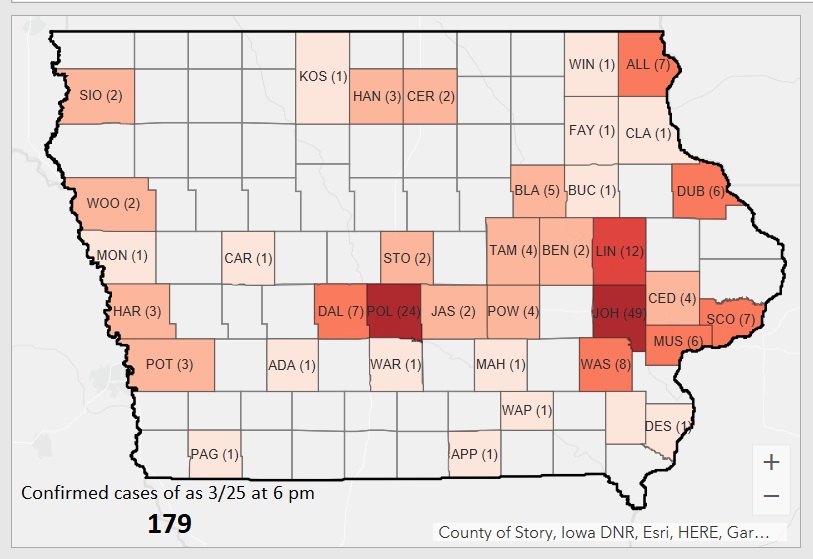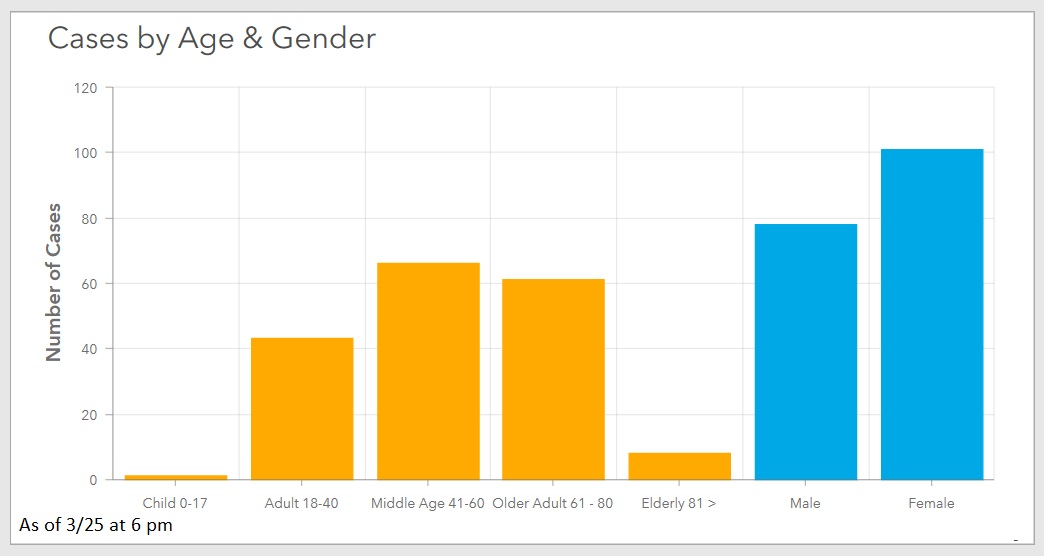Iowa Gov Kim Reynolds on Thursday extended the public health disaster declaration through April 16 at 11:59 pm. Her original declaration on March 17 included a March 31 end date.
Reynolds also expanded the public health emergency declaration to suspended all elective and non-essential medical and dental procedures, effective Friday, March 27, at 5 pm. The proclamation specifically names elective surgeries and procedures that utilize personal protective equipment for providers.
She added to the list of business closures. Effective Thursday, March 26, at 10 pm all bookstores, clothing stores, shoe stores, jewelry stores, luggage stores, cosmetic, beauty or perfume stores, florists, and furniture and home furnishing stores are closed.
The proclamation does not affect other retail establishments such as discount stores, grocery stores, or pharmacies that sell those goods in addition to other essential food, medical supplies and household goods.
Business closures already mandated through March 31, as well as the prohibition of gatherings of more than 10 people are extended to April 7 at 11:59 pm.
The new proclamation also requires mandatory screening of all health facility staff. Greene County Medical Center implemented the required screening March 20.
“These additional steps along with those we’ve already taken are equivalent to the goals of many of the shelter in place orders. I understand that these decisions will continue to impact the lives and livelihoods of Iowans, but the more we do now to mitigate the spread of the (COVID-19) virus, the sooner we will get this so that life and business can get back to normal,” Reynolds said at a press conference Thursday.
She also reported on unemployment claims in Iowa. According to Iowa Workforce Development, 40,952 new claims for unemployment were filed between March 15 and March 21. More than $10.6 million in unemployment insurance benefits was paid to Iowans the week ending March 20. She called those numbers “unprecedented but not unexpected.”
She said parts of the business sector have been “intentionally dialed back” toward the goal of COVID-19 mitigation. “I know these decisions have an impact on families and businesses, which is why we have also worked very hard to put in place measures that would assist business owners, individuals and families that have been directly impacted by the orders.”
“In these uncertain times we are taking extraordinary measures to preserve our way of life. This is not a typical economic downturn. I believe that once COVID-19 is under control, that Iowa will make a strong comeback and again be recognized as a national employment leader,” she said.
During the Q & A portion of the press conference, Reynolds did not respond directly to a question of how close Iowa is to the meeting the metrics she uses in determining what further steps (including a shelter in place order) may be necessary. She also did not say what metrics led to the new business closures put in place. The incubation period for COVID-19 can be as long as 14 days, which is longer than the initial measures have been in place. This week and next week will be important in determining if those measures have worked, she said.
Reynolds was adamant in responding to a journalist who cited examples of Iowans not taking seriously the current recommendations to stay home and not gather in groups. “We need to be responsible. We are Iowans. I shouldn’t have to issue an order to say you need to stay home and be responsible if you’re sick. I think the people who aren’t adhering to the order right now, I don’t know if issuing an order is going to get them to adhere to it. We all have a responsibility to take care of everyone, and I’ve said that over and over. You have a responsibility to especially help our most vulnerable Iowans to make sure we’re not exposing them. We do that by following the orders that have been put in place,” Reynolds scolded.
Numbers reported by the Iowa Department of Public Health (IDPH) on Thursday show 34 additional positive cases of Iowans with COVID-19, for a total of 179 positive cases (as of March 25 at 6 pm.) There have been a total of 2,975 negative tests to date, which includes testing reported by the State Hygienic Lab and other labs.
According to IDPH, the locations and age ranges of the 34 individuals include:
Appanoose County, 1 elderly adult (81+)
Black Hawk County, 1 middle-age adult (18-40 years)
Cedar County, 1 middle-age (18-40 years), 1 older (61-80 years), 1 elderly (81+)
Clayton County, 1 adult (18-40 years)
Des Moines County, 1 adult (18-40 years)
Jasper County, 1 elderly (81+)
Johnson County, 1 adult (18-40 years), 4 middle-aged adults (41-60 years), 1 older (61-80 years)
Linn County, 1 adult (18-40 years), 3 middle-aged adults (41-60 years), 1 older adult (61-80 years)
Mahaska County, 1 older adult (61-80 years)
Monona County, 1 older adult (61-80 years)
Page County, 1 middle-aged adult (41-60 years)
Polk County, 1 adult (18-40 years), 2 middle-aged (41-60 years), 1 older (61-80 years)
Pottawattamie County, 1 middle-aged adult (41-60 years)
Scott County, 1 elderly, 3 middle-aged (41-60 years)
Sioux County, 1 older adult (61-80 years)
Washington County, 2 older adults (61-80 years)

